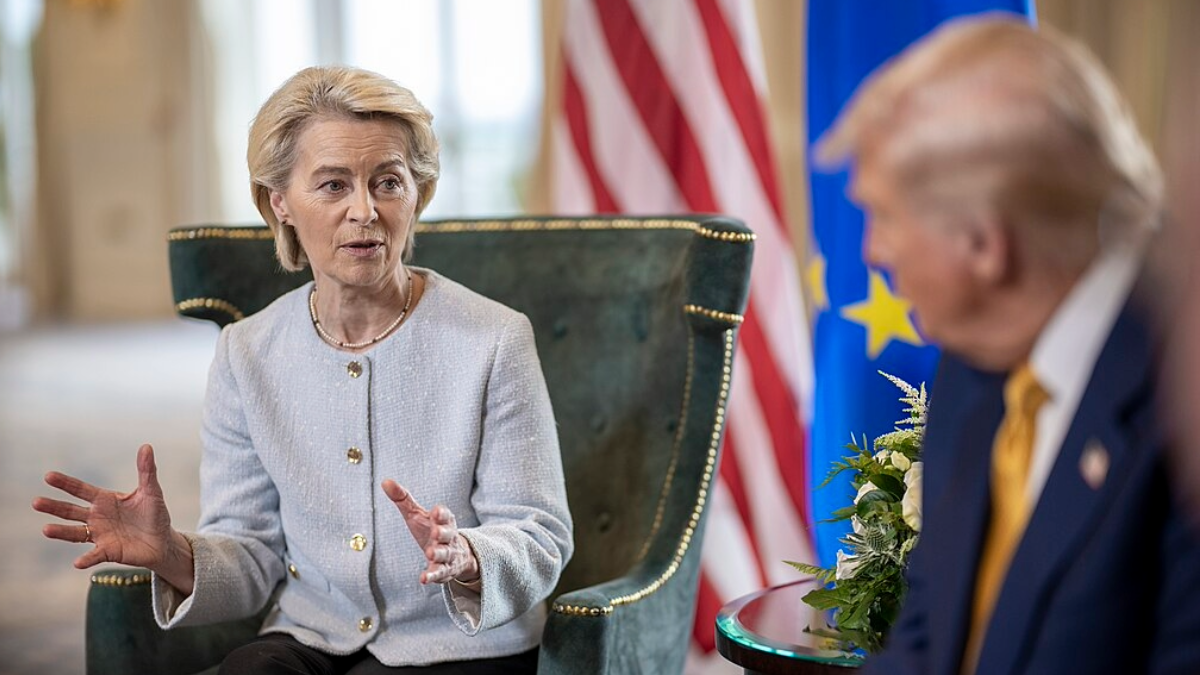Europe Can’t Defend Democracy on US Servers
Alexandra Geese / Oct 17, 2025This piece is part of the "Ideas for Europe’s Future" series by Tech Policy Press. Read more about the series here.

US President Donald Trump meeting with the President of the European Commission Ursula von der Leyen in Scotland, July 27, 2025. The White House, Public domain, via Wikimedia Commons.
European democracy faces a coordinated assault. From the East, Putin is unleashing unprecedented propaganda campaigns that sway elections and erode pro-Ukraine majorities in the European Council. From the West, United States President Donald Trump threatens retaliatory tariffs if Europe enforces its own rules. He brands the taxation of US tech giants on par with European firms, the user rights enshrined in the Digital Services Act, and the competition sanctions under the Digital Markets Act as discrimination against US companies—essentially demanding that Europe renounce its own democratic rules in the digital realm. European sovereignty hangs in the balance. As long as 80 percent of European digital products and services originate in the United States, blackmail will thrive.
Europe needs independent European infrastructure now—especially home-grown social networks that preserve a level playing field for information, safeguard media freedom and guarantee genuine freedom of speech, including the right to access facts instead of being fed lies and propaganda. The recent TikTok deal in the United States, where Trump toys with turning the platform into a MAGA propaganda engine alongside friendly investors, should send chills through Europe. We know the Orban playbook too well. US platforms amplify Russian disinformation and drown political debate in noise. Romania repeated a presidential election after its secret service uncovered thousands of influencers paid to boost an obscure candidate. Even in the run-up to the repetition of the canceled election, Global Witness found TikTok’s algorithm delivered almost three times more far-right content to newly registered, politically balanced users than any other political material.
European platforms that reject toxic algorithms and surveillance-grade data profiling constitute the foundation of digital-era democracy.
But a platform alone won’t suffice. Every social network depends on cloud infrastructure. De-platforming an entire service isn’t a fantasy—it already happened. In 2021, AWS booted the far-right network Parler from its servers. Consequently, any truly independent European social network must rest on a robust, sovereign cloud backbone.
That’s only the start. After Eurostack gained momentum in Europe, Microsoft pledged to sue the US government to shield European data. Weeks later, International Criminal Court (ICC) chief prosecutor Karim Khan watched his Microsoft-hosted email being blocked. Europe’s reliance on Microsoft starkly illustrates the bloc’s vulnerability to foreign tech.
Look at the big picture: political sovereignty evaporates without social media that are free from government or billionaire domination. Freedom from blackmail requires a resilient digital infrastructure, as the threat of it being shut down feels alarmingly real. Europe must attack every weak point simultaneously, advancing on multiple fronts step by step.
Three solutions to secure Europe’s digital sovereignty
1. Eurostack: building an independent European tech stack
Europe can build an open and democratic stack alongside potential allies such as Canada, Brazil, Australia, South Korea, Taiwan, India, and others. The stack must span critical resources: hardware, chips, networks, IoT devices, cloud, software, platforms, algorithms, data, and AI. This stack should start with European firms and gradually expand into a broader ecosystem that guarantees fair competition. By leveraging existing strengths, such as environmentally efficient European cloud providers and the wealth of industrial data Europe possesses, Europe can chart a unique path in AI and digital infrastructure, rather than imitating US or Chinese models.
Innovation typically stems from necessity; today’s AI applications, by contrast, are largely the product of an excessive concentration of data and processing power. Europeans must reverse that trend and develop AI to address genuine challenges, rather than imposing its harms on society without delivering meaningful improvements to people’s quality of life. Moreover, while Eurostack emphasizes hardware, the AI era compels us to secure free and unbiased access to knowledge as part of an independent digital backbone.
Two forthcoming pieces of legislation are pivotal for this vision:
- The Cloud and AI Development Act offers an opportunity to delineate categories of data that European companies must retain within the EU, such as medical records of European citizens or defence-related information. These data categories must be defined broadly enough to cover all critical domains. Moreover, the Act should embed a sovereignty provision that curtails the current “sovereignty-washing” practiced by US hyperscalers in partnership with European firms. Here, sovereignty means fostering genuine competence and capacity inside the Union, rather than relying on complex legal tricks that depend on foreign-controlled technology.
- The Public-Procurement Directive is slated for revision in 2026. In line with the Industry Committee’s own-initiative report, European Commission President Ursula von der Leyen has announced a “Buy-European” clause. This clause would give European suppliers priority when public administrations procure digital products and services, ensuring a steady stream of public-sector demand that enables firms to invest long-term in digital infrastructure. Such public-led markets would also help direct European capital, currently too often channeled toward US firms, into domestic technology companies.
2. Homegrown European social networks
In the short term, Europe needs home-grown social networks to cement political sovereignty. These services must champion algorithmic pluralism, ban recommendation engines that reward outrage and hate, and give users explicit control over what they see, no more “revealed preferences” that mask surveillance. European networks can prove that profit and quality coexist without toxic algorithms, surveillance advertising, or billionaire oversight. Traditional media and advertisers hold the key to success. As Google’s ad monopoly devours media revenues and AI tools harvest content for data, journalism’s financial model crumbles at an alarming rate. When media shift their output to European platforms, advertising dollars will flow, creating mass-appeal services for 450 million citizens. This isn’t a niche experiment; it’s a continent-wide migration from US and Chinese platforms to transparent, democratic hubs that nurture, not destroy, democracy. Eurosky.social is launching building blocks for a trusted European platform in November 2025 and is already attracting huge interest.
3. Strong enforcement of Europe’s digital laws
Current engagement-based ranking boosts polarizing and hateful speech while downranking other content. Since attention spans are limited, this constitutes a restriction on freedom of expression and media freedom. Media adhering to journalistic standards are systematically outperformed by sensationalist propaganda, limiting users’ access to fact-based information. The European Commission should urgently assess systemic risks to public discourse, electoral processes, media freedom, and freedom of expression under Article 34 DSA, and take mitigating measures according to Article 35 DSA, banning engagement-based ranking. Manual intervention in algorithms to boost or limit certain accounts or political actors, as practiced by Elon Musk on X, should also be banned. Users’ choice, based on expressly stated preferences and algorithmic pluralism, is a direct alternative that guarantees freedom of expression.
The Google ad-tech case must set an example. Structural measures are the only way for companies like Google to comply with the law. Strong competition enforcement under the DMA, combined with rigorous application of all relevant digital legislation, is essential to ensure Europe can establish a broad, fair, and independent network of digital companies.
At the same time, Europe must address the fiscal imbalance created by large US tech firms: while European companies pay taxes at home, these foreign giants contribute very little despite profiting from Europe’s highly skilled workforce and benefits such as universal health care. This de facto discrimination against European businesses must end. If the United States does not ratify the OECD agreement on global taxation, Europe should introduce its own digital tax to restore a fiscally level playing field. Additional revenue generated could also be earmarked for public investment in the Eurostack.
Time is running out
The clock is ticking; every day we stall, we hand another foothold to authoritarian actors. The challenge is immense, but surrender is not an option. Europe must reconcile the paradox of building its own digital infrastructure while forging robust global partnerships with like-minded nations. Let’s be bold. The time for decisive, collaborative action is now.
Authors
